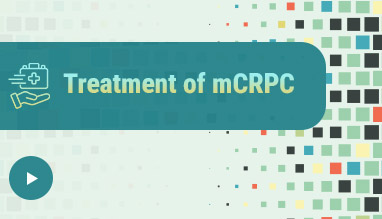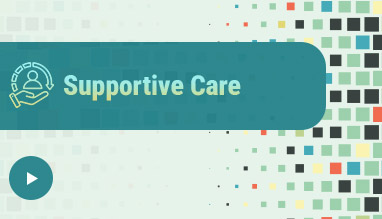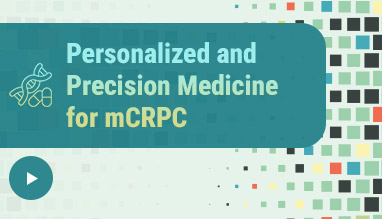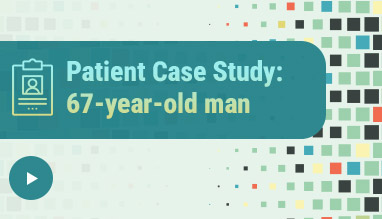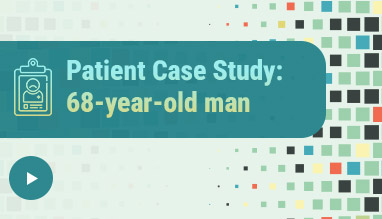Education & Discussion Guides
View these video modules on important topics addressing inequities in prostate cancer, including navigating optimal treatment selection and identifying how to support the unique needs of your patients with metastatic castration-resistant prostate cancer (mCRPC). There are also patient cases featuring expert insights and discussion points that you can apply in your practice as well as practical tools aligned with each content topic. Drive changes to positively impact care for your patients by ensuring all patients have access to the right therapies at the right time.
Do you want to bring this education to your team? Utilize the downloadable discussion guides and slide decks listed below the videos! An additional video on adult learning principles and presentation tips is provided to help you develop and lead sessions with your team.
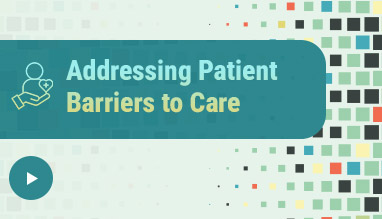
Mr. McNichol and Ms. Catenacci discuss their approaches to addressing treatment delays
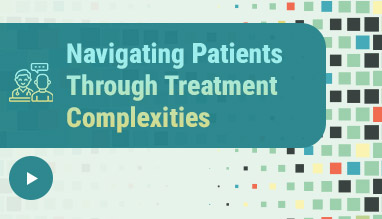
Mr. McNichol and Ms. Catenacci discuss communication across their multidisciplinary team
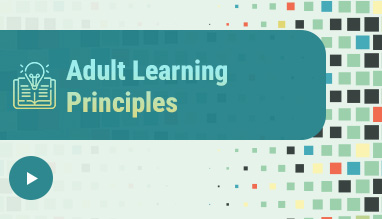
Get tips to help deliver compelling education to your team and other audiences
Clinical Tools
Use these clinical tools and resources to enhance your clinical practice and supplement the education.
Clinical Tools
-
ACCC Case Studies on Overcoming Disparities
- Review of strategies to address disparities in prostate cancer
-
ACCC Financial Advocacy Toolkit
- Toolkit to develop and implement financial advocacy services for patients with cancer
-
AONN Navigator Guide on Advanced Prostate Cancer
- Comprehensive guide on navigating patients through advanced prostate care
-
ASCO Guideline on Palliative Care
- Guidelines for palliative care in oncology
-
ASCO Guidelines for Systemic Therapy in mCRPC
- Guidelines on systemic therapy and treatment selection
-
CMS Health-Related Social Needs Screening Tool
- Tool for screening patients' health-related social needs
-
Guide to Improving Clinical Trial Access
- Guide to improving clinical trial access
-
PRAPARE® Screening Tool
- Tool for screening patient risks
-
PRAPARE® Toolkit to Assess and Address SDOH
- Toolkit for implementing tools and addressing patients’ social drivers of health
-
Team-Based Approaches to Addressing Disparities
- Guide to screening and documenting disparities in care
Training
- Fact Sheet: Black Women, Birthing People, and Maternal Mental Health
- Quick Guide to Perinatal Depression Screening
- Quick Guide to Treatment
Patient Education & Resources
Comprehensive services for patients with cancer
Patient education resources on genetic testing
Web tool to help patients make informed decisions about genetic testing
Patient resource on benefits of clinical trial participation
Patient resource that aggregates local resources
Patient education guide to finances in cancer care
Patient education webinar on treatment landscape for mCRPC
Patient webinar on need for bone health medications
Patient education video on imaging types and their role in care
Program for patients to access navigational assistance
Interested in participating in a digital quality improvement program? Think quality improvement is only possible in large, well-resourced hospital systems? The education and practical tools in this activity are also part of a scalable and customizable digital improvement program that was designed for efficient use in clinical practices of all sizes. Complete an assessment to identify how your processes align with pre-identified performance measures and then use the system to dynamically identify goals and create an action plan for improvement. Return 30+ days later and complete a reassessment. It’s that simple.
For Physicians:
- Satisfies MOC (Part IV) requirements
- Qualifies as a medium weight MIPS improvement activity
For Pharmacists:
- Enhance patient safety, increase efficiency and cost-effectiveness, and continue to increase pharmacist role in healthcare decision-making
- Meet various hospital accreditation standards
Elevate mCRPC Care: Practical QI You Can Apply Now!
Begin Here
Hear from faculty on why QI is essential for impactful care of patients with mCRPC:

Understanding your own practice’s performance in terms of equitable care for prostate cancer promotes practice change because it allows you an opportunity for systems-level introspection. - Samuel L. Washington III, MD, MAS


This longitudinal QI activity [includes] a retention check to see if it has changed practice…and to make sure the quality differences you hoped to achieve were gained. - Russell Z. Szmulewitz, MD



